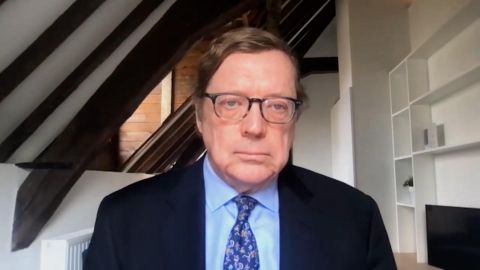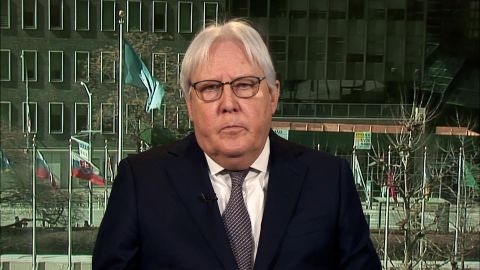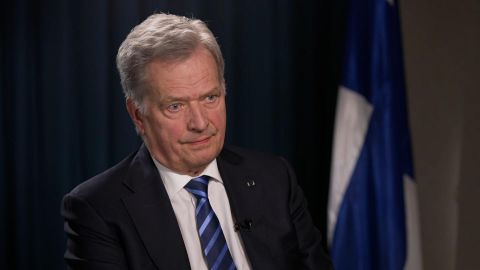Read Transcript EXPAND
CHRISTIANE AMANPOUR: Numerous war crimes investigations against the Putin regime are underway as the attacks on Ukraine intensify. David Scheffer was the first U.S. Ambassador-at-large for war crimes issues. And he joins Michel Martin to evaluate the chances of convicting Putin and his henchmen.
(BEGIN VIDEO CLIP)
MICHEL MARTIN, CONTRIBUTOR: Thanks, Christiane. Ambassador David Scheffer, thank you for speaking with us.
DAVID SCHEFFER, FMR. U.S. AMBASSADOR-AT-LARGE FOR WAR CRIMES ISSUE: Thank you very much. Appreciate it.
MARTIN: What we’re seeing in Ukraine right now is horrific. We’ve seen that 47 civilians were killed when Russian airstrikes hit two school and several apartment blocks. We’ve seen a maternity ward was bombed. The W.H.O, the World Health Organization says that, there’s been a spate of attacks on health care facilities. Are these war crimes?
SCHEFFER: Yes, they definitely are. There’s no question about that. I think the only issue really is if there are investigations, and there are, of these war crimes, who specifically is responsible for the actual order and commission of a particular war crime? But above that, there’s also who are the commanders? Who are both the military and political commanders that, in general, have unleashed these war crimes upon Ukraine? Because that will take us up the ladder of command responsibility and of superior responsibility. The thing that is so easy about Ukraine, quite frankly, is that we know that the orders are coming from the top because they’re publicly confirmed every day. Vladimir Putin incriminates himself every day. His footprints are all over this war of aggression. And so, his generals also clearly must understand what is going on on the ground because it’s publicized so clearly. So, that is inferential knowledge of the war crimes being committed and they have the responsibility as commanders, not only to prevent them but also to punish those who commit those crimes. So, neither of those have been shown yet, prevention or punishment.
MARTIN: How do we define war crimes in the modern era?
SCHEFFER: Well, this is a little unique, because what has occurred in Ukraine is a war and thus a crime of aggression. And, therefore, once you have launched an aggressive war on to the territory of another state, essentially everything you do on the territory of that state is illegal. In other word, firing any of these munitions is illegal. Moving your troops through and taking over civilian neighborhoods, is completely illegal because it is a war of aggression. So, that’s on a much larger plane that probably has more significance, both politically and what will ultimately be claimed against Russia for reparations for the damage and the injury they’ve — they’re inflicting on Ukraine. But for individual prosecution of war crimes, well, they occur during an armed conflict which clearly undoubtedly is taking place in Ukraine. And we’ve had rules built up over the last — oh, my goodness, since the mid- 19th century, essentially, as to how one can legally conduct warfare, combatant-to-combatant. That’s what the law of war establishes. And it also establishes who must be protected from that combatant-to-combatant fighting, and that includes civilian populations, prisoners of war, those who are outside of the combat. And we know from what we’re seeing on the screens and from print reporters, et cetera, that civilians are immensely affected. Their civilian residences are being damaged and destroyed. Hospitals, museums, churches, all of these should be outside of the zone of legitimate combat in any armed conflict. And we’re seeing it completely blow up in Ukraine. So, it’s a massive collection of war crimes.
MARTIN: I want to talk about who has jurisdiction and how this prosecution could actually take place in a — but before we get to that, I think one of the things, you know, mistakes do happen. I mean, mistakes do happen in war, you know, unfortunately, tragically. Do you think that these civilian facilities have been specifically and deliberately targeted by the Russians?
SCHEFFER: Well, I think they have admitted as much. That’s what’s so incredible. They are incriminating themselves every single day. They could have said that the missile hit on the hospital was a clear mistake, that the missile was aimed for a different location. That it went in error to hit just outside the hospital. But instead, they actually admitted that they intentionally fired the missile for that location on the — what we know, is the bogus claim, that they made about, you know, other individuals being there, they’re not patients, et cetera. Which was totally, I mean, no judge, in any trial would ever even believe that allegation as a defense. And prior conflicts that have gone before the International War Crimes tribunals, (INAUDIBLE), et cetera, and the ICC, successful defenses have been raised by defendants regarding the mistakes that are made during armed conflict. And there’s a tremendous amount of give and take in the courtroom about whether it’s an intentional hit or a mistaken hit. But here, the Russians are not claiming mistakes at all. They are incriminating themselves every single day by saying they intentionally make these hits.
MARTIN: So, who has jurisdiction here? How would this be prosecuted?
SCHEFFER: Well, first and foremost, the International Criminal Court is seized with jurisdiction on Ukraine. And therefore, has begun and continued, actually, an official investigation with the support of 39 member States of the court that have actually referred Ukraine to the court. So, I think the lead entity will be the International Criminal Court. They will — obviously, they’re very good at it. They’re professional. And they will be looking at individual war crimes, incidents, and gathering the various forensic and other evidence that is associated with those. And that includes overhead imagery from satellites and et cetera. It includes intercepts that might be made available by various governments, including the Ukrainian government to the court. So, all of that will be pieced together. It’s rather painstaking. But in this case, I do think that we may see the ICC be able to arrive at a command responsibility indictment, sooner than later, simply because they’re so public, the Russians, in their command of all of this. That it’s not as if the court has to take lower-level officials, build the case that they committed war crimes and did so under the direction of superior officers, and of Putin. The Putin and superior officers are already essentially admitting that they’re doing this. And so, therefore, it’s — I think that’s going to happen. But I also want to emphasize that we have already underway by the Ukrainian prosecutor general’s office, the prospect that when the time comes, there will be domestic prosecutions in Ukrainian ports of soldiers and officers committing these war crimes. The leadership will be taken care of by the ICC and perhaps some other special tribunal that might prosecute the war of aggression which the ICC cannot in this situation. Those will go to commanders and to Putin himself. But for years to come, Ukrainian domestic courts will be prosecuting Russian soldiers and officers.
MARTIN: But having said that though, Russia is not a party to the International Criminal Court, neither is Ukraine and neither, for that matter, is the United States. Does that matter?
SCHEFFER: Well, in this case it does and it does not. And the reason is that, Ukraine has, under the authority of the Rome Statute of the court, vested jurisdiction in this matter to the court. So, it has made that sovereign decision, even though it’s not a state party, it is entitled under the Rome Statute to deliver a declaration, which frankly has been on deck since 2013 and the earlier conflict and then renewed again a couple of years later. All of those declarations continue into the future as well. And therefore, the Ukrainian government has given jurisdiction to the ICC. Now, as for Russia, which is not a state party, the problem is they’re committing these crimes on the territory of Ukraine. Criminal law is very, very territorial. And, therefore, the Ukrainian government has vested in the ICC the authority to undertake criminal investigations for crimes committed on its territory. The big issue will be, well, if they indict — if the ICC indicts, which in their vernacular sort of issue an arrest warrant for Vladimir Putin and the generals, how do you ever get custody of them? Because it’s not an unsubstantiated jurisdiction. They have to be in the courtroom and the hay to actually be prosecuted. And that’s where, in the future, the leverage of the West, the United States, the European Union, et cetera, will become a factor in terms of how this is ultimately resolved. Both in terms of the withdrawal of Russian forces from Ukraine as well as the ultimate surrender of individuals to the Hague.
MARTIN: I’m guessing that others who are listening to our conversation might be struggling with the question of, what difference does this make? He’s willing to inflict a lot of pain on his own people in order to wage this campaign. That is — either he miscalculated badly or he just doesn’t care. I guess, you sort of wondered, like, what difference does this make? This seems like — the accountability seems awfully far into the future. Does it seem that way to you?
SCHEFFER: Well, I think everyone needs to recognize first that International Criminal Justice is the long game. I mean, the cases that are dealt with by the tribunals are 10, 20, 25 years old. In the Cambodia Tribunal, they were even longer, 30, 35 years. But they did result in convictions ultimately. So, it’s the long game. And the accountability, ultimately, both for future generations, for the historic record and to, sort of, send a clary and call that, ultimately you face justice is extremely important. I don’t think we should place on to the courts and on to the issue of accountability the challenge of resolving the immediate crisis, the immediate aggression, the immediate war crimes. That requires, quite frankly, the strategized and for military responses, assistance responses, and what can possibly be achieved through negotiations. That has nothing to do with justice. It is the long game. But it is a very important long game just as Nuremberg and Tokyo were after World War II, they sent clear messages out. And it is a fact that if you look empirically at where war crimes trials have, in fact, been taking place since World War II, and particularly the last 30 years, in front of tribunals and even domestic courts, those societies have not returned to violence and internal conflict and aggression. They have evolved into relatively peaceful societies. So, I would hope that that ultimately will be the result. But in the short-term, the challenges are military, political, economic.
MARTIN: What does evidence look like in this situation? It’s been remarkable how much we have seen. But we’re not always sure what it is that we are seeing. What constitutes evidence here? And also, we — just the remarkable social media activity around this. Is that evidence?
SCHEFFER: Well, you know, I’m so glad you asked that question, Michel. Because it is essential that people understand that simply because of a clip of something or the media is filming something on site, which are clearly war crimes taking place, that that somehow is automatically available and usable in a courtroom as evidence. Quite frankly, not necessarily is the case because there will be challenges as to the timing, whether it’s been tampered with. All sorts of things take place in the courtroom that can challenge what we see as obvious evidence, but which a juror, you know, a judge in a courtroom would not necessarily buy into. Let me just suggest to your viewers and others in the world that there is an app that can be downloaded on a smartphone and most people in Ukraine have smartphones, not iPhones, which is www.iwitness.global. And if one goes to that site, you can download unto your smartphone a way to video these incidents in real time. And the video goes immediately into a lock box server with a timestamp, location stamp, everything on it, such that it can be easily available in the courtroom as incontrovertible evidence of what is being actually viewed. So, it’s just important to try to get that out. But in terms of the larger question, you know, the evidence includes overhead imagery shots. It includes intercepts. It includes what is being said publicly by the Russian government. It includes what’s found on dead Russian soldiers that, you know, if their pockets are picked, their usually there are little pieces of paper or other things they — that indicate where they should be going, et cetera. And also, just very formalized interviews with refugees, and also ultimately with prisoners of war, Russian prisoners of war under Geneva Convention standards that will ultimately implicate, you know, not only those who are committing these crimes, but also sort of established precisely what actually happened on the ground at that moment on that day.
MARTIN: Before we let you go, Ambassador, speaking of the long game, do you think that these structures of accountability themselves need to be rethought?
SCHEFFER: I do think that in terms of the structures that are involved, quite frankly, it’s not that we need to build new courts. The permanent court has been built. It does require the support of a broader swath of the international community than the 123 States that currently are member to it. I think the United States, which was so instrumental in the drafting of the Rome Statute of the International Criminal Court and put a lot of American thinking into it, a lot of common law thinking into it, a lot of due process protections into that statute. That the United States really needs to stop — or at least part of the United States, needs to stop being intimidated by the prospect of international criminal justice. We’re supposed to be a society of the rule of law. If we do something that violates the Geneva Conventions. If we do something that violates the law of war. If we even dare to think about committing a crime against humanity, which is an assault on a civilian population that is systematic or widespread, we have a problem in the United States that needs to be dealt with very seriously. We should be standing for the principles of enforcing these rules. And the court exists to do that as well as our domestic courts. And I’ll finish my point with this that right now, you know, we have the capacity in our federal law to prosecute war crimes and genocide. We do not have the capacity in our federal law to prosecute crimes against humanity. There’s a bill now being developed in the senate, under Senator Durbin’s leadership, to do exactly that. And we should just pass that law. And if we do, no Russian involved in the Ukraine operation would dare set foot in the United States, because if he or she does, they will be taken down and thrown into a federal courtroom. So, we need to do things like that ourselves to demonstrate our commitment to the rule of law and that we do not shirk from that challenge.
MARTIN: Ambassador David Scheffer, thank you so much for talking with us today.
SCHEFFER: Thank you very much. Appreciate it.
About This Episode EXPAND
To discuss the dire humanitarian situation, Christiane speaks with the U.N.’s emergency relief coordinator, Martin Griffiths. Christiane speaks with Finland’s President Sauli Niinistö to get a sense of Putin’s endgame. David Scheffer was the first U.S. Ambassador-at-Large for War Crimes Issues. He evaluates the chances of convicting Putin and his henchmen.
LEARN MORE


